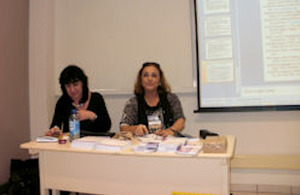DFID Research: OBSERVE - Monitoring the application of a new domestic violence law in Brazil
Brazil’s Maria da Penha Law was put in place to prevent and combat domestic and family violence against women

Symposium on Feminism and Public Policies for Confronting Domestic Violence.
Brazil’s Maria da Penha Law was put in place to prevent and combat domestic and family violence against women. Named as a tribute to Maria da Penha Maia, a woman who suffered at the hands of domestic violence herself and is now a notable figure in the movement for women’s rights in Brazil, the law was first sanctioned in 2006 by President Luiz Inacio Lula da Silva.
A project, backed by the Pathways of Women’s Empowerment RPC, called the ‘Maria da Penha Law Observatory Consortium (OBSERVE)’, was launched in order to ensure the adequate and efficient implementation of the law. The consortium consists of feminist organizations and university research centres focusing on gender studies, which monitor the application of the law in 27 Brazilian states.
OBSERVE, coordinated by NEIM/UFBA, conducted research in six cities and revealed that, almost two years since the introduction of the new legislation, progress has been slow towards its complete implementation. OBSERVE then extended research to include all state capitals, collating information from the ‘Police Stations for Assaulted Women’ (DEAMs) and the Domestic Violence Courts.
A grant from the United Nations Development Fund for Women allowed OBSERVE to conduct a study of the network of state services provided to assaulted women in four state capitals: Salvador, Belem, Porto Alegre, and Rio de Janeiro as well as Brasilia, the Federal District. This grant also facilitated a survey across nine Brazilian cities of women who have experienced domestic violence and used DEAMs.
In addition, OBSERVE coordinated a 3-day symposium during the meetings at Fazendo Genero 9, at the Federal University of Santa Catarina, in Florianopolis. The team presented the results of the research on DEAMs and Domestic Violence Courts during the event to an audience of 150.
Preliminary research findings indicate that a number of problems obstruct the desired application of the law. For example, there is a lack of data and an incompatibility of existing information on cases, important for statistical calculations. This is mainly due to a lack of training, knowledge of the law, and record-keeping procedures among officials and clerical workers.
Nonetheless, this work represents the first great achievement of feminist and women’s movements in Brazil towards universalising the right of women to a life without violence.
For women suffering in violent domestic situations, access to formal justice forms only part of the solution. Not only is the formation of inter-sectoral and integrated policies essential, but women should also have access to knowledge building and empowering information on their rights.
OBSERVE has launched the series Cadernos do OBSERVE to publish articles and the results of studies and surveys. There are 1,000 issues of the first two publications in the series and 400 of each were distributed for free during the Fazendo Genero 9 meetings. Copies were also sent to DEAMs and Domestic Violence Courts in Brazil and to university research centres.